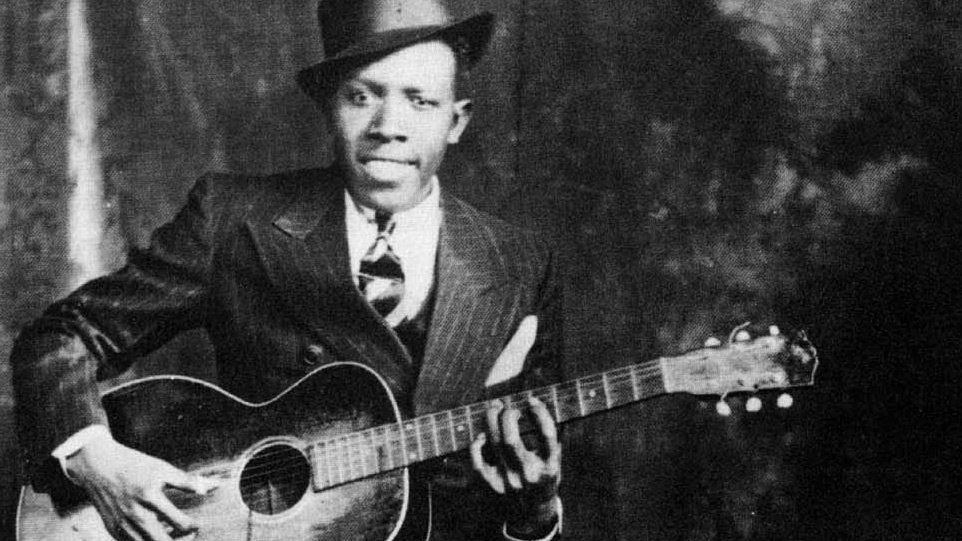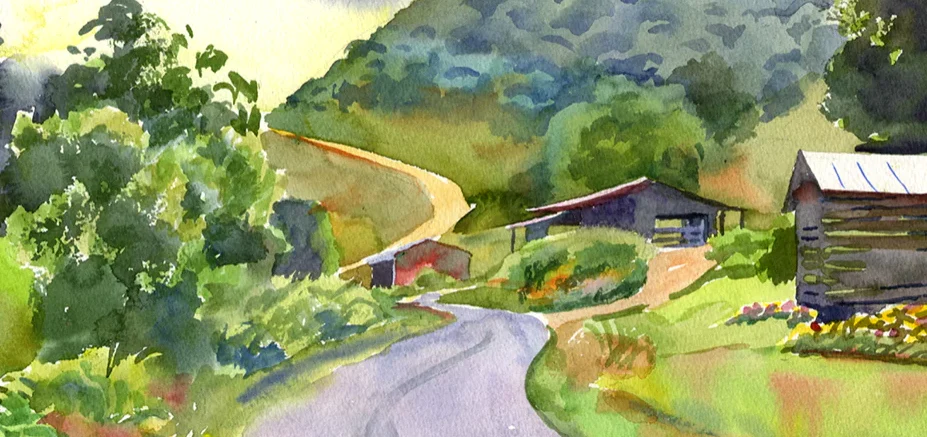
One of the two known photos of Robert Johnson. This portrait was taken by the Hooks Bros. Photography Company in Memphis, Tenn., circa 1935.
Johnson’s life was a struggle from day one, but his heirs are doing everything they can to help young aspiring musicians chase their dreams.
When you think of the blues, you may think of Muddy Waters or B.B. King. When you think of rock-and-roll, you think of Jimi Hendrix or the Rolling Stones. No one could argue the greatness of these musicians or their genius; but many do not know or understand the impact Robert Johnson had on their music.
Johnson lived a life of tragedy, mystery, and brief success before meeting an untimely death, all before he was 27 years old. Only through researchers, a few family members, and word of mouth has Johnson’s story remained alive.
Johnson’s life was a tragedy from the start
Robert Johnson was born to a sharecropper family in Hazlehurst, Mississippi in 1911. He was born just one generation from the abolishment of slavery but still oppressed by the systems that locked poor black families into a cycle of backbreaking work for the slightest of wages. His father, Noah Johnson, moved his family to the Delta to escape a lynch mob.
The desire to be more than just a field hand started early in life. When Robert was expected to be working in the fields, he was instead playing his guitar and singing the songs that came from the bitterness of oppression – it is said that perhaps Robert was abused because of his lack of work ethic.
Though it is not known exactly when Johnson started playing in juke joints, he did take a brief time to put the music aside when he met and married his wife, Virginia Travis. When she was eight months pregnant, she returned to her family home to birth the baby. Johnson stayed behind to work, but as the birth grew closer, he decided to travel to his wife and child, playing at juke joints along the way for extra cash. When he arrived at the home of Travis’s family, he learned that both his young bride and the baby had died in childbirth and had already been buried.
This devastation pushed him into music and drove his passion to be a big star, and his home away from home became bars and juke joints.
The man is a mystery
Robert Johnson’s life was one of tragedy, hardship and rejection that ended with an untimely death at just 27 years old. Finding details of his short life, and even shorter music career, was mostly a word-of-mouth effort for years after he died. Johnson only had 29 songs that were recorded; and those weren’t even widely released until an emergence of the Blues hit in the late 1950s. There were only two known photos of Johnson, and no video footage – his death certificate wasn’t even discovered until 1967. Truly, Robert Johnson was a mystery that captivated researchers and music historians.
Netflix released a documentary, Remastered: Devil at the Crossroads, telling the tragic story of Johnson’s life and his impact on the music industry, along with the help of his family, Steven and Michael Johnson. In the documentary, greats like Keith Richards, Keb’ Mo’ and Bonnie Raitt detail how Johnson’s magical, before-its-time sound influenced their own musical journeys.
Researchers in the documentary pondered how Johnson was able to pull off the sound of a whole band on an old six-string that he rigged to be a seven-string. The fact that he was considered “noisy at best” before disappearing for a year and re-emerging as the foundational father of the modern Blues only added fuel to the mysterious fire that surrounded him.
After the death of his wife and baby, Johnson began to hit up juke joints and follow his idols, Son House and Willie Brown. When they would finish a set, he’d get on stage with his guitar and start playing. He was novice at best, noisy at worst, and the crowds were annoyed by the sound his strumming bounced off the walls.
One day, Johnson was gone. He disappeared for nearly 18 months before showing back up at a juke joint in Banks, Mississippi where Son House and Willie Brown were playing. This time though, he didn’t just pluck the guitar. He made it sing in ways that made other musicians question what he had done – and at what price it had been done – to get so good so quickly.
The myth of the crossroads
Media and mystery have long suggested that Robert Johnson went down to the Crossroads in the Delta where he sold his soul to the devil for a supernatural musical talent. The Netflix documentary depicts a cartoonish Johnson on his knees, handing his guitar to the devil for a tune-up, before the devil offered it back to him in exchange for his soul. The 1986 film Crossroads is based on the myth of a demonic trade between the Prince of Death and the King of the Delta Blues.
Robert Johnson himself did not do anything to stop the myth of what happened at the Crossroads; if anything, he perpetuated it. His lyrics oozed with references to walking alongside evil and hoodoo references linked to lore of old African magic. If those examples aren’t blatant enough, he had one song entitled Crossroads, in which Robert, referring to himself as Bob, falls to his knees, begging for help, knowing “dark gon’ catch me here.”
Johnson’s family, however, suggests that he didn’t sell his soul to the devil, but instead spent that mysterious year and a half with Ike Zimmerman, another super-talent in the Blues world. The Johnsons say that Robert had gone back to the Hazlehurst area to find his father, Noah, and instead met Zimmerman. The two would meet in the Beauregard Cemetery for Zimmerman to teach Johnson, because there was no crowd there to complain about the noise he was making. In this version of the legend, he spent all his time for those 18 months honing the craft and then returned to the Delta juke joints, where his talent amazed all and began to pave the way of what we know as blues today.
As it begins, so it ends
The talent and soul that Johnson poured into the Blues made him a sensation in the Delta. While jumping from juke to juke playing the blues, Johnson met a young schoolgirl by the name of Virgie Cain. Virgie was raised in a religious family; so when she became pregnant with their son her family pushed Robert away and forbade a relationship between them.
Torn by losing yet another lover and child, Johnson hit the whisky, women, and juke joints with tenacity. He recorded 29 songs. In August 1938, Johnson died near Greenwood, Mississippi. While his death certificate states he died of complications of syphilis, his family, storytellers and researchers allege that his whisky was poisoned at a bar called Three Forks in Banks, Mississippi, after Johnson was found to be in an affair with the wife of one of the owners.
Johnson’s death at 27 years old, coupled with the myth of the crossroads, is said by the researchers of the ReMastered to be the basis of the infamous “27 Club,” which is a collection of troubled music artists who died at the age of 27 after dealing with their various demons. Jim Morrison, Jimi Hendrix, Janis Joplin, Kurt Cobain and Amy Winehouse are all among the group of uber talented musicians who met an early death at the height of their careers.
Johnson’s legacy lives on
So much of Robert Johnson’s music lives on today. Thanks to the re-release of his 29-song album in 1958, Johnson’s music permeated the music world and despite his early death he became a legend. Musicians all over the world have covered his iconic tunes. His impact on the music industry is eternal.
Johnson’s life was a struggle from day one, but his heirs are doing everything they can to help young aspiring musicians chase their dreams.
The Robert Johnson Blues Foundation not only operates the Robert Johnson Blues Museum in Crystal Springs, Mississippi, it also provides scholarships to young musicians of any genre to pursue their dreams of becoming artists.
“We want people to know about Robert Johnson and about his impact,” said Steve Johnson, Robert Johnson’s great-grandson and co-director of the Robert Johnson Blues Foundation.
The Foundation runs the Robert Johnson Blues Museum in Crystal Springs, which Steve said has attracted people from all over the world.
“We’ve had people from all over Europe; from France, from Germany, from England,” said Steve. “They know more about Robert Johnson than our young people today that are right here in Mississippi.”
The museum alludes even more to the mystery of Robert Johnson’s life. There’s not much from his own time there – most items are donated in honor of the impact Johnson made on other blues artists. Only a piano and a couple of pictures are tied directly to Johnson himself.
So, despite having only 29 songs, 27 years on this Earth, and a demonic legend attached to his name, Robert Johnson is a name that will forever stretch well beyond his poor Delta story with an eternal imprint on the music industry.











